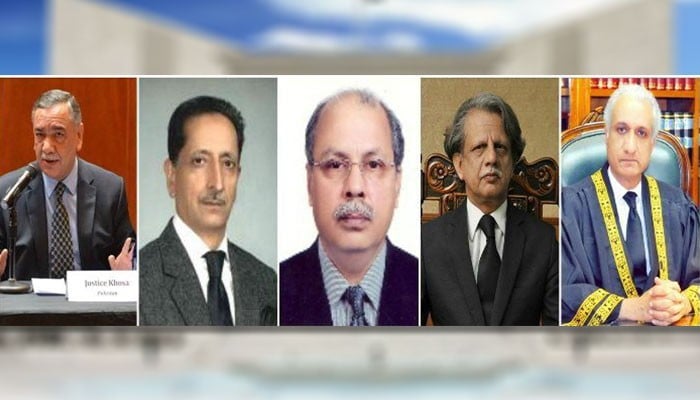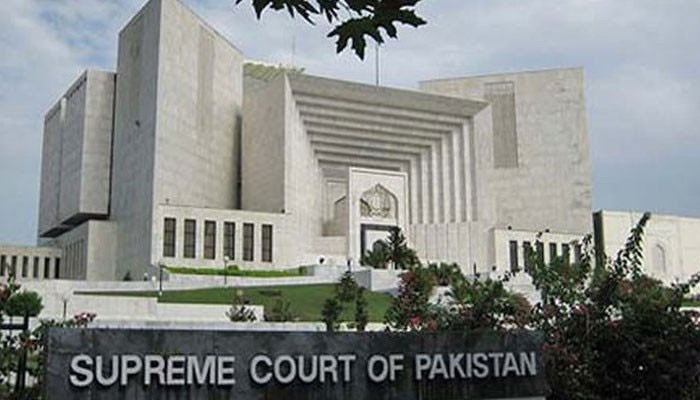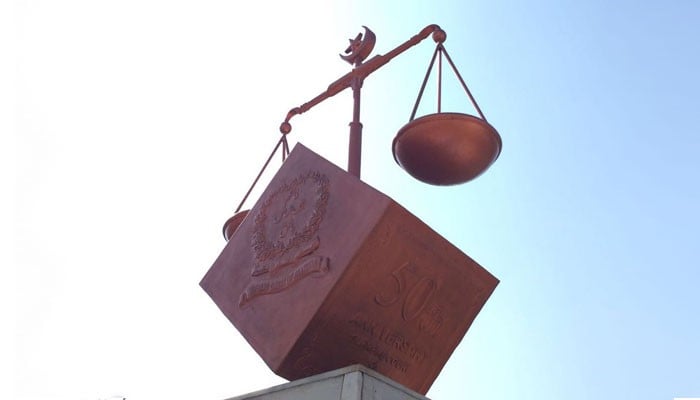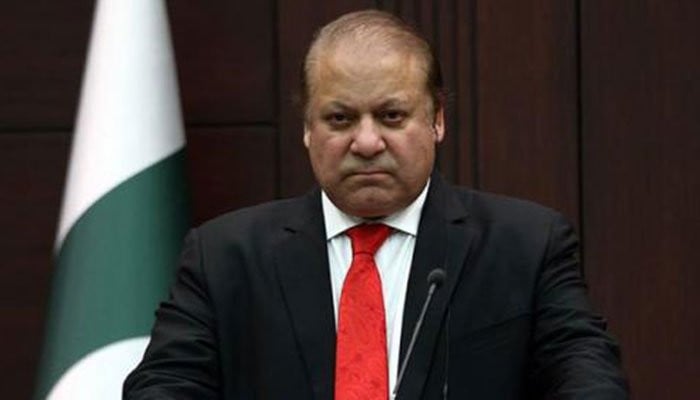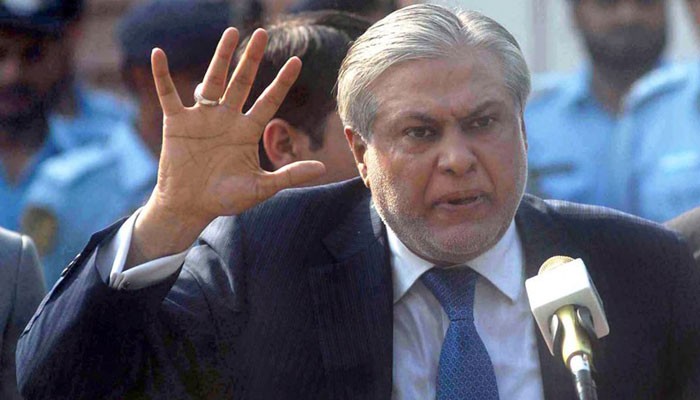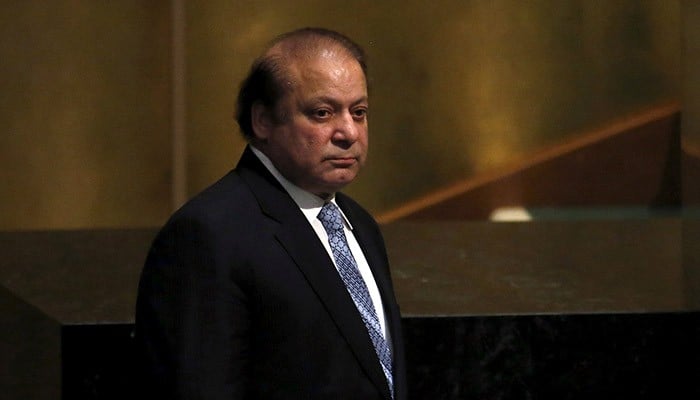Decision to disqualify Nawaz was unanimous, observes Supreme Court
September 13, 2017
ISLAMABAD: The Supreme Court, hearing review petitions filed by the Sharif family and Finance Minister Ishaq Dar on Wednesday, observed that the reasons to disqualify Nawaz Sharif as prime minister may have differed but the decision was unanimous.
The remarks were made by Justice Asif Saeed Khosa, who is heading a five-member bench hearing the review pleas against the apex court's judgment in the Panama Papers case on July 28.
During the hearing, Justice Azmat Saeed Sheikh observed that the final Panama case verdict was to be decided by the same five-member bench which had given the April 20 judgment.
Justice Azmat remarked the apex court had formed an implementation bench but the decision was to be ultimately made by the five-member bench. The implementation bench was to work as per directions provided by the five-member bench, he observed.
Former prime minister Nawaz Sharif, through his petition, has argued that the decision passed by the court on July 28 should have been passed by a three-member bench as Justice Khosa and Justice Gulzar Ahmed's jurisdiction had expired after their dissenting judgment on April 20. The same has been argued in petitions filed by Nawaz’s children, Hasan, Hussain and Maryam and son-in-law MNA Captain (retd) Safdar as well as Dar.
The counsel of Nawaz, Khawaja Harris, argued before the court that the final verdict [in the Panama Papers case] by the five-judge bench was not right as two honourable bench members had already given their verdict.
He said that there was no mention of a larger bench in the April 20 judgment and the decision should have been made by the same three-member bench which heard the JIT investigation.
Harris was presenting his arguments before a five-member bench which began hearing today the review petitions filed by the former prime minister, his family and Finance Minister Ishaq Dar.
"My client was not given a fair trial. No show-cause notice was issued to him nor a chance to explain his position," argued Harris.
In response, Justice Ijaz remarked that the judgment of the two judges [on April 20] was not challenged, thus it can be inferred that it was accepted. Harris responded that that was a minority judgment and was thus not challenged.
Harris contended that the question is whether the court could order the National Accountability Bureau to launch an investigation, adding that there is no legal precedent of appointment of a monitoring judge in such a case.
"Nawaz's basic rights were usurped by appointing monitoring judge," Harris said further.
Justice Ejaz said that the accountability court is free to reach its own decision. The investigation can be reviewed and that the petitioners will be allowed the opportunity to argue with the witnesses and JIT members, he said.
Responding to objections raised in the petitions about the commendations and appreciations of the JIT as "a gross transgression" of the former prime minister's right to a fair trial, Justice Ejaz said that he had praised the JIT report but it will be scrutinised in the trial court.
At one point, Justice Khosa remarked that those who authored the judgment know what they wrote.
Justice Khosa observed that the content could be different but the result was the same. “Nawaz Sharif was disqualified in both judgments,” he remarked.
However, Harris maintained that a five-judge bench could not have given the July 28 judgment.
Nawaz's counsel also argued that the matter of receiving or not receiving a salary was not part of the petition.
The hearing was then adjourned until tomorrow, September 14.
The counsel for Nawaz's children and son-in-law, Salman Akram Raja, was also present in the courtroom and is expected to present his arguments tomorrow.
The Supreme Court had decided on Tuesday to the Sharifs’ plea that a five-judge bench is formed to hear the review petitions against the July 28 Panama Papers case verdict instead of an already-formed three-member bench.
The new bench, headed by Justice Asif Saeed Khosa, includes Justice Gulzar Ahmed, Justice Ejaz Afzal Khan, Justice Sheikh Azmat Saeed and Justice Ijazul Ahsan.
All five judges were part of the Panama Papers case bench that disqualified Nawaz and ordered the filing of corruption cases against the others.
During hearing of the plea by the Sharifs for the formation of a larger bench on Tuesday, Raja pleaded the three-member bench of the apex court, headed by Justice Ejaz and comprising Justice Azmat and Justice Ahsan, to form a five-member bench to hear their review petitions.
He also pleaded that their review petition against the judgment of the five-member bench be taken up first.
Justice Ejaz observed that the three-judge bench gave the majority verdict in the Panama Papers case and that the decision would not have been different had the three-judge bench given a verdict in the case.
However, the bench accepted Raja's plea and sent to the chief justice a request seeking the formation of a five-judge bench, which was notified later in the day.
During Tuesday's hearing, Harris was also present and presented his arguments.
Nawaz's children seek five-member review bench
Nawaz's daughter Maryam, sons Hussain and Hasan, and son-in-law MNA Captain (retd) Safdar, moved an application in the apex court on Monday praying that their review pleas be heard by a five-member bench, instead of the three-member bench, and that the hearing be delayed till the formation of the five-member bench.
The children of the former premier reminded the court that they had filed two separate review petitions — one against the decision of the five-member Panama case bench and the other against the decision of the three-member implementation bench, thus the application against the decision of the five-member bench should be heard first.
They pleaded the court to hear the review pleas against the five-member bench verdict first. They contended that since July 28 verdict that disqualified Nawaz Sharif as prime minister was final, and was signed and announced by a five-member bench, therefore, the review petitions should also be heard by a five-member bench instead of a three-member bench.
The application further stated that the same five-member bench or any other bench of the same size should be constituted to hear the review applications against the five-member bench verdict.
“In terms of legal and constitutional dispensation of the State of Pakistan, a Supreme Court bench of lesser strength cannot upset or pre-empt the decision of a larger bench," they contended.
Nawaz's review petition
On August 15, the former prime minister filed three petitions in the Supreme Court to review the Panama Papers verdict which resulted in his disqualification.
The petitions pleaded the apex court to dismiss the petitions filed by Sheikh Rasheed, Imran Khan and Siraj-ul-Haq.
The former prime minister, through his petition, argued that the decision passed by the court on July 28 should have been passed by a three-member bench as Justice Asif Saeed Khosa and Justice Gulzar Ahmed's jurisdiction had expired after their dissenting judgment on April 20.
"That by signing the Final Order of the Court dated 28.07.2017, the hon’ble two Members of the “Bench” have actually passed two final Judgments in the same case, which is unprecedented in judicial history," said the appeal filed, a copy of which is available with Geo News.
The petitions also called the commendations and appreciations of the JIT "a gross transgression" of the former prime minister's right to a fair trial.
The former premier has also filed a request before the apex court to issue a stay order on the implementation of the Supreme Court verdict.
Ishaq Dar's review petition
On August 21, Finance Minister Ishaq Dar filed a review petition against the Panama Papers case verdict.
Dar’s petition was filed by lawyers Shahid Hamid and Dr Tariq Hasan, who requested the apex court to null and void it's July 28 decision and to halt the NAB references against Dar till the verdict on the review petition.
In the nine-page review petition, Dar objected on the working of Panama case JIT, stating “the JIT self-evidently exceeded its mandate by opining on whether or not Petitioner’s assets were disproportionate to his known source of income and this august Court has regrettably erred in law…. in passing a NAB reference against the petitioner on the basis of a JIT report that was way beyond its mandate.”
The finance minister in his appeal also mentioned that Article 184 (3) of the Constitution cannot be used to usurp basic human rights of an individual, further adding that a three-member bench heard the Panama case after the submission of the JIT report, but the final decision was given by a five-member bench.
Dar also said that the appointment of a judge to monitor NAB’s proceedings will affect the trial proceedings.
Sharif children, son-in-law file review pleas
On August 25, Nawaz's children and son-in-law also challenged the apex court's July 28 verdict.
One review petition was filed against the three-judge decision and another against the five-judge decision of the apex court.
There is no accusation or evidence against Safdar, Nawaz's son-in-law, regarding the purchase of the Sharifs' London properties but still NAB was ordered to file a reference against him, the petition claimed.

It said further that the posting of a monitoring judge to oversee implementation of the verdict is against the law, explaining that the accountability court cannot operate independently after the appointment of an implementation judge.
The petitioners claim that their basic rights have been infringed upon as their objections to the JIT's final probe report were not taken into consideration. Moreover, it is stated that the JIT investigation was incomplete and thus cannot be used as a basis for filing a NAB reference.
It has been argued in the review petition that the original five-member bench could not have delivered the final verdict as two judges from that bench were no longer part of the proceedings since the JIT's work was overseen by the special three-member implementation bench.
The Panama Papers case verdict
Nawaz was disqualified under Article 62 (1)(f) of the Constitution by the Supreme Court on July 28.
Announcing its verdict in the high-profile case, the five-member bench had unanimously disqualified Nawaz for failing to disclose his un-withdrawn receivables constituting assets from UAE-based Capital FZE in his nominations papers for the 2013 General Election, stating that this meant he was not ‘honest’ and ‘truthful’, as per the Constitution.
In the verdict, all five judges ruled to send references against Nawaz Sharif, his children, son-in-law and Dar to an accountability court.
The court also ordered the National Accountability Bureau (NAB) to file a reference against the accused in an accountability court in six weeks and directed for the trial to be wrapped up within six months.
The NAB, as per the directives, has filed the references in the accountability court of Islamabad.
